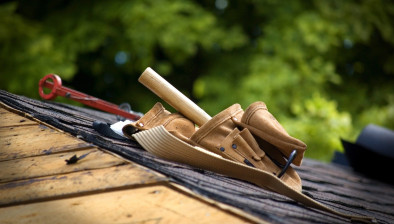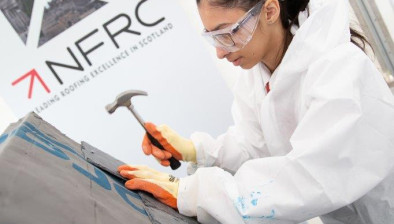Global timber shortage putting UK housebuilding supply chain under ‘enormous pressure’
Leading voices from the UK roofing industry have warned of faltering availability and rapidly rising costs of basic materials such as roofing batten.
The National Federation of Roofing Contractors (NFRC), Avonside Group (including Avonside Roofing), Marley and SR Timber said global timber shortages have put the UK housebuilding industry’s supply chain under “enormous pressure” and presents a “serious challenge” to the industry as a whole.
The organisations expressed “grave concerns” about “extremely low” available stocks of European softwood (the raw material used to produce UK roofing batten) at a time of sustained high levels of demand from the housebuilding industry as it continues to recover from all the disruption caused by the pandemic.
The shortages are fuelling steep and rapid cost inflation for roofing contractors, forcing them to make a choice about paying the rising cost of materials (knowing they can’t pass on the increase to their customers). They are also running out of materials because the housebuilding supply chain is struggling to hold back the tide of global factors that are far beyond the UK’s control, the organisation added.
Demand from the three biggest global markets of China, America and Russia has contributed to a situation that may take months to stabilise and years to fully recover.
China is the world’s largest importer of softwood and hardwood logs, with half of its supply derived from imports. It has been hit hard by factors such as flooding and the imposition of increasingly strict forest protection measures, which have seen a near hold in domestic logging activities. China has been looking to Europe and other regions for additional supply, following the announcement that Russia is proposing a ban on exports of softwood logs and valuable hardwood logs.
North America is still reeling from the first pandemic lockdown, which saw the closure of half of Canadian and a third of US sawmills. This led to a halt in American and Canadian exports to the world market – and the US timber industry experienced an estimated $1.1bn loss in 2020 because of wildfires, hurricanes and the pandemic. Consequently, imports are at the highest level in 15 years.
Russia is the world’s largest exporter, but its proposed export restrictions are already impacting the global timber market – and especially its relationship with China.
Despite sawmill closures during the first lockdown across Europe, the major producing countries (such as Sweden) maintained their production and in some cases increased it. However, in the space of a few weeks, Europe became the world’s leading exporter of sawn softwood. In Scandinavia and Central Europe, sawn log prices, as well as routing and transport costs, are rising rapidly. Anecdotal feedback from sources within the sector highlights stories of gazumping, with raw material sellers reneging on orders in favour of higher offers. It’s a sellers’ market!
These effects, along with the sharp growth in DIY and garden projects during COVID lockdowns, robust construction recovery, and shipping- and freight-related issues, are all conspiring against a return to plenty of available timber stock.
For roofing contractors, the biggest impacts are on cost and productivity. Delays in supplies of materials such as batten present a real and serious risk to housebuilders’ production schedules, the financial impact of which can be severe. However, the cost of avoiding such delays within the supply chain can itself be significant.
Avonside Group’s CEO Eddie Stanton said: “The price of roofing batten is rising on a monthly basis, already in excess of 50% over the past six months, and supply lead times are getting longer. This is putting enormous pressure on the housebuilding supply chain, especially roofing contractors, in terms of what price increases they can absorb and what they have to pass on.”
The industry’s leading timber batten suppliers are going to great lengths to keep their customers informed about the current stockholding, lead times and pricing.
Reflecting on Marley’s position in respect of its JB Red timber brand, the company’s roof systems director Stuart Nicholson said: “The global/US pressure of increased demand for timber has exacerbated the supply issues caused by the pandemic and Brexit. Therefore, it remains extremely challenging to secure the raw materials needed to produce and supply finished products. Marley has strong relationships and a robust supply chain with more than 60 timber mills. However, even considering this, current demand levels are outstripping supply. This is having a severe knock-on effect on global softwood timber prices, which are constantly increasing.
“Those in the UK supply chain are working hard to secure increased supplies of raw materials and finished products. It is important to work collaboratively, with housebuilders engaging with their suppliers and subcontractors to understand the challenges and to plan ahead.”
SR Timber’s trading director Shaun Revill said: “We’re in the very fortunate position of having our own dedicated sawmill in the Baltics, which means we have our own robust supply chain – but even that has been tested to the limit recently with Brexit and COVID, and we are not insulated from what’s going on globally.
“We have been very proactive and transparent with our customers and given them lots of information to explain the situation regarding stock availability – which currently has a lead time of around ten days – and price movements. This has been well received when you put it into context that the industry hasn’t seen anything like this since World War II.”
James Talman, chief executive of the NFRC, said: “We are currently seeing unprecedented shortages of roofing materials, in particular timber. This is due to a whole host of different reasons, from COVID-19 restrictions to the impact of low US timber supplies. Our data shows that two-thirds of roofing contractors saw material availability deteriorate in the first quarter of the year, and 89 per cent reported price rises. Timber battens were the second-highest material shortage after roof tiles with a third of contractors reporting shortages. Unsurprisingly, this is the top concern for roofing contractors – above COVID and Brexit.
“Whilst our supplier members are doing all they can to alleviate shortages, it will still be some time before we are back to steady levels of supply, and homebuilders therefore need to work collaboratively with roofing contractors to plan ahead, build in lead times, factor in price rises and ensure flexibility in contracts.”
The availability of construction products is likely to get worse before it gets better, according to a recent statement by the Construction Leadership Council’s (CLC) Product Availability Group.
SR Timber noted that even if sawn wood production is able to meet European demand, thanks to very abundant forest availability, it will take longer than usual to meet orders already taken whilst at the same time rebuilding the minimum stock level in sawmills.
All this means that roofing contractors are having to plan material supply further and further in advance, in the hope that batten suppliers are able to meet forecast volumes. When shortages happen, they are usually last minute and at the expense of production time, with further impacts on costs due to the need for alternative sourcing.
In many cases, the rising batten prices and the additional costs involved in dealing with material shortages will be unsustainable if the burden is not shared, and that can only be bad for UK housing production in the short term.
The NFRC, Avonside Group, Marley and SR Timber all agree that the roofing and housebuilding industries must come together to address these rising costs to ensure that contractors and batten suppliers can afford to buy the materials essential to keep putting roofs on the houses that Britain demands.























